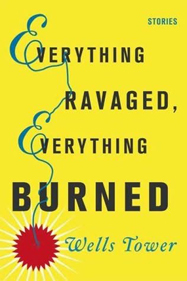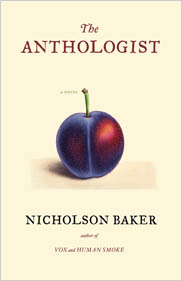-
March 16, 2010
Opening Round
-
Commentary by
Kevin Guilfoile & John Warner
-
Today’s Winner:
2The Anthologist
John: Molly Young couldn’t be more right about one thing, which is that The Anthologist is “fucking weird.” But then all of Nicholson Baker’s books are weird. His brand of weirdness is even weird, a kind of minimalist maximalism where he will take a very very small thing and wring every ounce of potential interest out of that small thing and then when that’s done, he’ll go even further. He is one of the few contemporary writers who is totally and completely himself. There is no analogy to describe what Nicholson Baker’s work is like. He resists metaphor. He is irreducible.
In the case of The Anthologist, the nominal subject is rhymed poetry out of which he squeezes a meditation on seemingly everything. In U and I, it’s Baker’s own obsession with John Updike. Baker’s first book, The Mezzanine, was recommended to me by my first creative writing teacher, TMN contributor Philip Graham, and after I read a 10-page digression on the eyelets on shoes that allow the laces to pass through cleanly, I remember thinking, I didn’t know you could do that? Followed by, I think I’d like to do that.
But of course I couldn’t do that. The only person who can do that is Nicholson Baker.
I started thinking again about The Anthologist in the context of David Shields’s new book, Reality Hunger, which is cutting a swath through the kinds of people that also follow our Tournament of Books. In the book, Shields advocates for a kind of revivification of the novel (or perhaps a burying of the traditional novel) by infusing it with the spirit of what he calls “the lyric essay” which, in his apparent definition, is a kind of remixing of fact and fiction. Like just about any manifesto, there are parts I agree with and others I disagree with, but I wonder if Baker’s work isn’t a kind of Platonic ideal of what Shields is advocating. Shields seems to want passionate books that are the product of our most personal obsessions and The Anthologist seems to fit that bill.
The Anthologist is far more engaging than it has any right to be given its lack of narrative drive, and Molly Young does a great job explaining its charms. I can’t imagine a wide readership for this book, but maybe I’m selling the public short.
Kevin: When I was in college I had a really good friend who kept insisting I read The Mezzanine. He would even carry it around with him and every time we saw each other, in the dining hall or at class, he would pull it out and say, “You gotta read this book, man. It’s fucking unbelievable.” So I finally read it and a couple days later I returned the book to him and he said, “So?” and I said, “That was good, I really liked it, thanks,” and he said, “What the fuck? You liked it? How could you only fucking like this book?” and I was like, “It’s the greatest novel about a guy riding an escalator that will ever be written,” and he shouted, “It’s not about a fucking escalator, dude!” I could feel his respect for me squishing in his socks as he walked away, across the quad.
I’m a fan of the high-concept, but Baker’s books usually feel outright gimmicky to me and so I never like them as much as I want to (and a couple of them I kind of actively dislike). Part of my frustration with his work is that he is extremely gifted, which makes me want to read him, but then when I read him I’m forced into this really awkward and completely unfair (to Baker) position where I wish he was writing about something else. Or rather writing about exactly the same things but in a different context. Listening to you and Judge Young talk about The Anthologist makes me want to dive back in, but I’m wary. Maybe if I do my old college buddy will get over his disappointment and friend me on Facebook.
John: I find Wells Tower’s prose simply electric. In the first story in Everything Ravaged, Everything Burned, he opens by violating an old creative writing saw, never start a story with a character waking up, but manages to bring the world fully alive in just a handful of sentences:
“Bob Munroe woke up on his face. His jaw hurt and morning birds were yelling and there was real discomfort in his underpants. He’d come in late, his spine throbbing from the bus ride down, and he had stretched out on the floor with a late dinner of two bricks of saltines. Now cracker bits were all over him—under his bare chest, stuck in the sweaty creases of his elbows and his neck, and the biggest and worst of them he could feel lodged deep into his buttock crack, like a flint arrowhead someone had shot in there.”
I know this kind of writing isn’t effortless, but it feels that way, which is just the best. I enjoyed the hell out of these stories, even when some of them slipped through my fingers feeling like they hadn’t quite gotten to the deepest places they could. I think the comparisons to Lorrie Moore are apt in some senses in that the writing is electrifying and there’s often an off-kilter humor at work in the stories, but the biggest similarity between them is the instant knowledge that these are writers who just have massive amounts of game.
If you and I can indulge in a little Chicago sports fandom for a moment, reading Everything Ravaged, Everything Burned reminded me of seeing Derek Rose pretty early in his rookie year almost end Andre Miller’s career with a crossover dribble move so vicious that Miller’s legs turned to worthless jello. It is clear from that play that Derek Rose possesses an uncommon gift for basketball, and that while he may not yet be one of the very elite players in the league, it’s only a matter of time until he will be. I’ll be buying Wells Tower’s next book, sight unseen, even if it’s about a guy riding an escalator while reading rhyming poetry.
Kevin: For me Tower was just about the most interesting writer of 2009. Tower is weirder than Moore is (but like Moore, also accessible), and you’re right about his skills. He’s awfully good. Yesterday we were talking about the “gravitas gap” when comparing a graphic novel to an actual novel. Judge Young sort of references that again here. I mean I could point out that in a story collection such as this any reader is going to like some stories more than others and once you start comparing an author to himself (as you do within a collection) it probably handicaps him when you then have to compare all his stories to a novel, but we are also sort of poking at a tangential discussion of just what it is about the novel, separate from other narrative art forms, that gives it such emotional force.
John: To be fair, I can think of many short stories that I think deliver all the emotional force of a novel. I read them all the time. “A Father’s Story” by Andre Dubus leaves me feeling like Andre Miller after I’d been crossed over by Derek Rose every time I read it. Chris Adrian’s “Promise Breaker,” shook me up pretty good recently. Last year’s short-story collection competitor, Jhumpa Lahiri’s Unaccustomed Earth, has a couple of stories that have stuck with me since. I could list 30, 50, 100 stories easily that knocked me on my ass, but then, I really like short stories. In a recent conversation with TMN’s Robert Birnbaum, Tobias Wolff—whose story “Bullet in the Brain” I could easily add to the list of jello-knees-inducing shorts above—names some of the stories he considers “perfect.” Maybe our readers can chime in with some of their own in the comments.
I would’ve easily picked Tower over Baker in this matchup, but as you note, even the best story collections are only going to have one or two knockouts. It’s a feat to even publish a collection that doesn’t have any duds in it. In assessing a novel, I think we forget or forgive slack moments or some narrative spackling as long as the overall effect is winning, particularly if it pulls off the end in a satisfactory way. I just finished reading Next by James Hynes, one of my favorite authors, and for the first 20 percent or so I was chafing a bit at the pacing, the seeming lack of forward momentum, but once I settled in and got what he was up to I was riveted, and the end, which I won’t spoil, rocked me. It fucked me up. (In that good way that books can fuck you up, that feeling like you’ve been temporarily unmoored, lost in this other world.) I don’t want to start anything else for a few days so I can just let it roil through me for a bit. This phenomenon isn’t really fair to short-story writers looking to win our tourney, but that’s part of what our little exercise points out about book prizes: the random “unfairness” of all of it.
Kevin: Again, you and I both had Everything Ravaged ranked higher than The Anthologist. Nevertheless, you pick up a couple points in our personal confidence pool. My lead is now just 53-46.
Kevin Guilfoile is a contributing writer for TMN. His debut novel, Cast of Shadows, has been translated into more than 17 languages, and his second novel, The Thousand, will be published in August 2010 by Alfred A. Knopf.
John Warner is a contributing writer for TMN. He is the author of Fondling Your Muse: Infallible Advice From a Published Author to the Writerly Aspirant. He teaches at Clemson University.

















